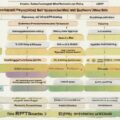Understanding social dynamics is crucial in today’s interconnected world. Social intelligence is a term that has gained prominence in psychological and business contexts alike. But what exactly does it entail? In this article, we’ll delve into the concept of social intelligence, explore various scales and theories, and offer strategies to improve your own social intelligence.
Defining Social Intelligence
Social intelligence is the ability to navigate complex social environments and relationships with ease. It involves an awareness of situations and the social dynamics that govern them, as well as the ability to understand and manage one’s own emotions and those of others. This skillset is essential for effective communication, empathy, and conflict resolution.
The Scales of Social Intelligence
Several scales have been developed to measure social intelligence, such as the Tromsø Social Intelligence Scale (TSIS) and the Emotional and Social Competence Inventory (ESCI). These tools assess factors like social awareness, social skills, and social information processing to provide insights into an individual’s social competence.
Key Theories of Social Intelligence
Two prominent theories of social intelligence are Edward Thorndike’s ‘social intelligence theory’ and Howard Gardner’s ‘multiple intelligences theory’, which includes interpersonal and intrapersonal intelligences. Thorndike’s theory emphasizes the ability to understand and manage people, while Gardner’s theory focuses on the capacity to understand oneself and to form accurate perceptions of others.
Strategies to Enhance Social Intelligence
Improving your social intelligence involves developing better communication skills, practicing empathy, and becoming more emotionally intelligent. Active listening, paying attention to non-verbal cues, and fostering a growth mindset can all contribute to enhanced social understanding and interactions.
Applying Social Intelligence in Everyday Life
Social intelligence can be applied in various aspects of life, from personal relationships to professional environments. It can lead to more successful networking, improved leadership, and increased overall life satisfaction by fostering healthier and more dynamic social interactions.
FAQ on Social Intelligence
What distinguishes social intelligence from emotional intelligence?
While emotional intelligence centers on recognizing and managing one’s own emotions, social intelligence extends to the understanding and navigating of social situations and the emotions of others.
Can social intelligence be learned or is it innate?
Social intelligence can be both innate and developed. While some individuals may naturally possess higher levels of social intelligence, others can improve it through learning and practice.
How does social intelligence impact workplace performance?
In the workplace, social intelligence contributes to better teamwork, leadership, and communication, which can enhance overall performance and productivity.
Are there any tests to measure social intelligence?
Yes, there are tests like the TSIS and ESCI that help in assessing an individual’s level of social intelligence.
What are some ways to improve social intelligence?
Some ways to improve social intelligence include engaging in active listening, observing social interactions, practicing empathy, and seeking feedback on social behavior.









